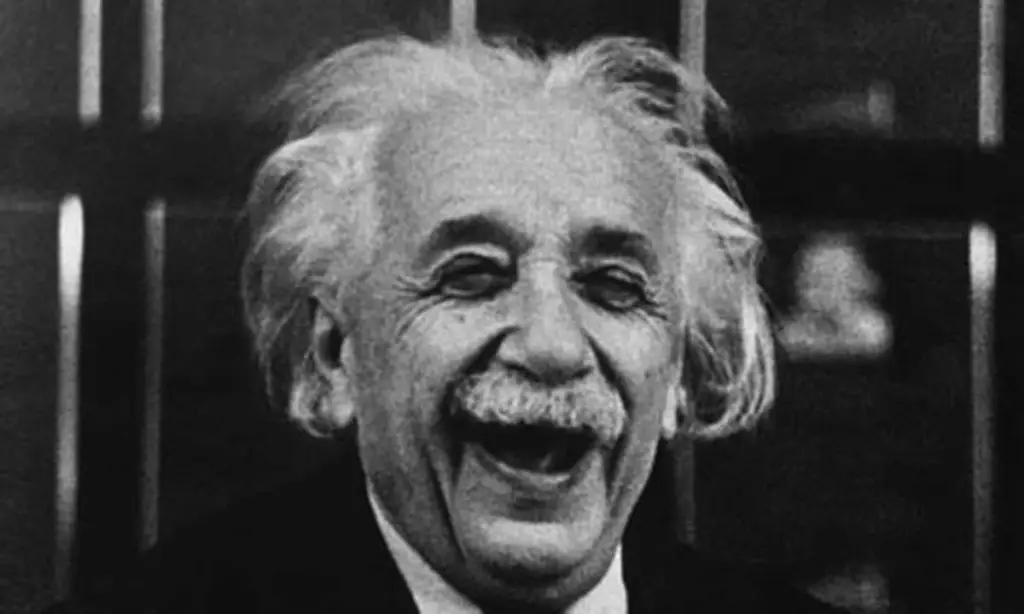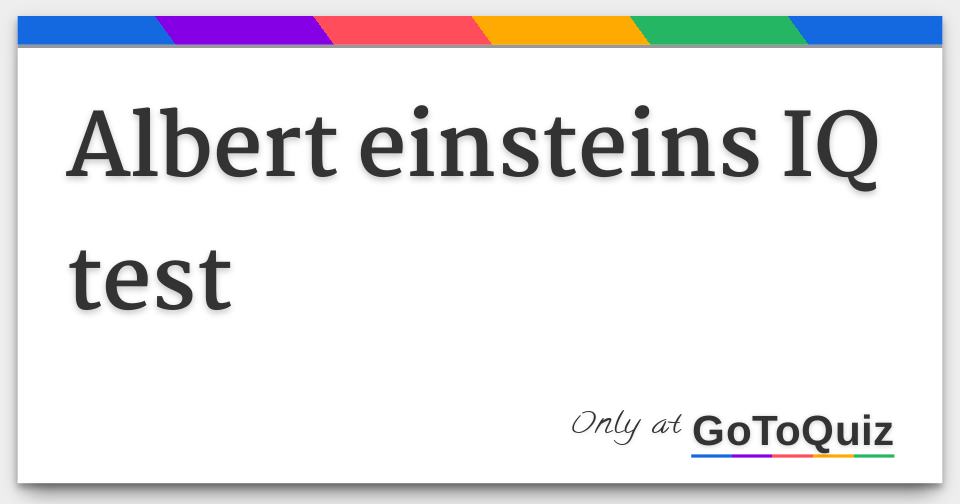Exploring The Genius Of Albert Einstein: IQ, Achievements, And Legacy
The intellectual capabilities of Albert Einstein have fascinated scientists, educators, and enthusiasts for generations. As the mind behind the groundbreaking theory of relativity, Einstein has left a lasting impression on the field of physics and beyond. His extraordinary intellect continues to inspire countless individuals to explore the vast potential of human capabilities.
When it comes to discussions about intelligence, the name Albert Einstein is often the first to come to mind. His monumental contributions to science and his legendary status have made him an enduring symbol of brilliance. But what exactly was Einstein’s IQ, and how did it influence his revolutionary discoveries? This article aims to delve into the fascinating world of Einstein's intellect, exploring its origins, impact, and legacy.
Through this exploration, we aim to provide a comprehensive understanding of Einstein's brilliance by examining his intellectual capacity, major accomplishments, and enduring legacy. Whether you are a student, a researcher, or simply someone curious about one of history's greatest minds, this article promises to offer valuable insights into the life and mind of Albert Einstein.
Read also:Is Dwayne Johnson Dead Debunking The Rumors And Celebrating His Legacy
Table of Contents
- The Life and Times of Albert Einstein
- Understanding Albert Einstein's IQ
- Einstein's Early Life and Education
- His Revolutionary Scientific Contributions
- The Theory of Relativity: A Closer Look
- Beyond IQ: Measuring True Genius
- The Enduring Legacy of Albert Einstein
- Einstein's Impact on Modern Science
- Common Misconceptions About Einstein's IQ
- Final Thoughts
The Life and Times of Albert Einstein
Born on March 14, 1879, in Ulm, Germany, Albert Einstein is one of the most celebrated figures in history. His life and career were marked by extraordinary achievements that revolutionized the scientific world. Below, we will explore a brief overview of his personal and professional journey, highlighting the key moments that defined his legacy.
Personal Data and Biodata
| Full Name | Albert Einstein |
|---|---|
| Date of Birth | March 14, 1879 |
| Place of Birth | Ulm, Germany |
| Profession | Theoretical Physicist |
| Major Achievements | Theory of Relativity, Nobel Prize in Physics (1921) |
| Date of Death | April 18, 1955 |
Einstein's life was characterized by brilliance and perseverance. Despite facing numerous challenges, his dedication to science and his relentless pursuit of knowledge left an enduring legacy that continues to influence modern science and inspire future generations.
Understanding Albert Einstein's IQ
For decades, Albert Einstein's IQ has been a subject of fascination and speculation. Although the exact number remains uncertain, it is widely believed that Einstein possessed an IQ ranging from 160 to 190. This extraordinary level of intelligence enabled him to make groundbreaking contributions to the field of physics, reshaping our understanding of the universe.
However, it is crucial to recognize that IQ is just one measure of intelligence. Einstein's genius extended far beyond numerical scores. His creativity, problem-solving abilities, and profound understanding of complex concepts set him apart from his peers. His ability to think outside the box and challenge established norms were defining traits of his intellectual prowess.
Einstein's Early Life and Education
Einstein's early life laid the groundwork for his future achievements. Born into a Jewish family, he demonstrated a keen interest in science and mathematics from a young age. However, his educational journey was not without its obstacles.
Challenges in School
- Einstein often struggled with traditional teaching methods, finding them restrictive and uninspiring.
- Despite these challenges, he excelled in subjects that captivated his interest, such as mathematics and physics.
- A compass gifted to him by his father sparked his fascination with the natural world, igniting a lifelong passion for discovery.
These early experiences profoundly shaped Einstein's approach to learning and problem-solving, fostering a deep curiosity and a commitment to exploring the unknown.
Read also:Exploring The Impact Of Rock Star Deaths Honoring Legends And Learning From Their Legacies
His Revolutionary Scientific Contributions
Albert Einstein's contributions to science are vast and varied. His groundbreaking theories and discoveries have fundamentally transformed our understanding of the universe. Below are some of his most notable achievements:
Key Contributions
- Theory of Relativity: Einstein's theory of relativity fundamentally altered our understanding of space and time, revolutionizing the field of physics.
- Photoelectric Effect: His explanation of the photoelectric effect earned him the Nobel Prize in Physics in 1921, laying the foundation for the development of quantum mechanics.
- Brownian Motion: Einstein provided a theoretical explanation for Brownian motion, confirming the existence of atoms and molecules and advancing our understanding of the microscopic world.
These groundbreaking contributions have had a lasting impact on the scientific community, inspiring new research and discoveries across various disciplines.
The Theory of Relativity: A Closer Look
Einstein's theory of relativity is perhaps his most famous contribution to science. It comprises two interrelated theories: special relativity and general relativity.
Special Relativity
Published in 1905, special relativity introduced the revolutionary concept that the laws of physics are the same for all non-accelerating observers. It also established the iconic equation E=mc², which demonstrated the relationship between energy and mass, fundamentally altering our understanding of the universe.
General Relativity
In 1915, Einstein expanded his theory to include gravity, proposing that massive objects cause a distortion in space-time. This theory has been confirmed through numerous experiments and observations, including the bending of light by gravity. The implications of general relativity are far-reaching, influencing everything from GPS technology to our understanding of black holes and the origins of the universe.
Beyond IQ: Measuring True Genius
While IQ provides some insight into a person's intellectual capabilities, it is not the sole measure of genius. Einstein's brilliance was defined by his ability to think creatively, connect seemingly unrelated ideas, and challenge established paradigms.
A study published in the journal Psychological Science highlights that creativity and divergent thinking are essential components of genius. Einstein's problem-solving approach exemplifies these traits, as he often employed visual and intuitive methods to arrive at complex solutions.
In addition to IQ, factors such as emotional intelligence, perseverance, and a willingness to take risks contribute significantly to the development of genius. Einstein's life and work serve as a testament to the multifaceted nature of intellectual achievement.
The Enduring Legacy of Albert Einstein
Einstein's legacy transcends his scientific achievements. He was a passionate advocate for peace, civil rights, and education. His humanitarian efforts and commitment to social justice have left an indelible mark on the world.
Einstein's influence can be seen across numerous fields, from theoretical physics to popular culture. His iconic image and insightful quotes continue to inspire people of all ages and backgrounds, making him a timeless figure of admiration and respect.
Einstein's Impact on Modern Science
Einstein's work has had a profound and lasting impact on modern science. His theories have paved the way for advancements in technology, medicine, and space exploration. Below are some examples of how Einstein's contributions continue to shape the scientific landscape:
- Quantum Mechanics: Einstein's early work on the photoelectric effect laid the foundation for the development of quantum mechanics, revolutionizing our understanding of the microscopic world.
- Cosmology: His theory of general relativity has been instrumental in our understanding of the universe's origins and evolution, providing a framework for modern cosmology.
- Technology: Applications of Einstein's theories can be found in everyday devices, such as GPS systems and lasers, demonstrating the practical implications of his groundbreaking work.
As science continues to evolve, Einstein's ideas remain highly relevant and continue to inspire new generations of scientists and researchers.
Common Misconceptions About Einstein's IQ
Despite his legendary status, there are several misconceptions about Albert Einstein's IQ. Below are some of the most common myths and the truths behind them:
Myth: Einstein Had an IQ of 200
There is no historical evidence to support the claim that Einstein had an IQ of 200. While his intelligence was undoubtedly exceptional, the exact number remains unknown. It is important to recognize that IQ is just one measure of intellectual capability.
Myth: Einstein Was a Late Bloomer
Einstein's early struggles in school have led to the misconception that he was a late bloomer. However, he demonstrated a keen interest in science and mathematics from a young age, excelling in subjects that captivated his curiosity. Dispelling these myths is essential for understanding the true nature of Einstein's genius and the factors that contributed to his success.
Final Thoughts
In conclusion, Albert Einstein's IQ and intellectual contributions have left an indelible mark on the world of science and beyond. From his groundbreaking theory of relativity to his humanitarian efforts, Einstein's legacy continues to inspire and educate people of all ages.
We invite you to share your thoughts and insights in the comments section below. Has Einstein's work inspired you? Which aspects of his genius do you find most fascinating? Your feedback helps us improve and provide more valuable content for our readers.
Thank you for reading, and we encourage you to explore other articles on our site that delve into the fascinating world of science and human potential. Together, we can continue to celebrate the brilliance of the human mind.
Article Recommendations


